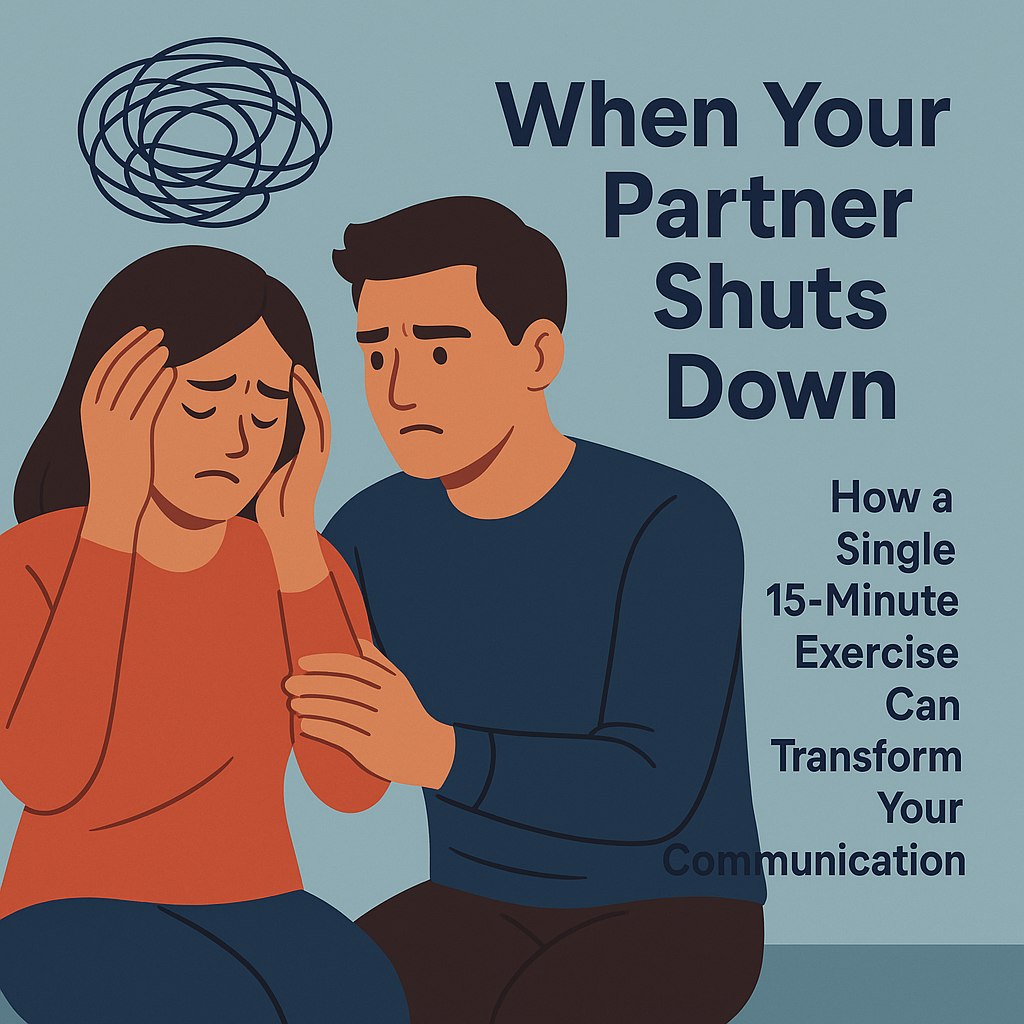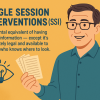When Your Partner Shuts Down
How a Single 15-Minute Exercise Can Transform Your Communication
We've all been there – in the middle of a heated discussion with our partner, suddenly they turn away, go silent, or worse, walk out of the room. What relationship experts call "stonewalling" isn't just frustrating; it's actually one of the four major predictors of divorce, according to 40 years of research.
But here's the hopeful news: You can start changing this pattern today, in just one focused session.
🔹 The Silent Treatment Isn't What You Think
When your partner stonewalls, it might feel like they're punishing you with silence. But research reveals something surprising: 83% of people who stonewall are actually overwhelmed and trying to protect themselves from emotional flooding. Their heart rate spikes, breathing quickens, and their brain literally can't process information effectively.
Think of it like this: Have you ever been so stressed that you couldn't think straight? That's what's happening when someone stonewalls. They're not trying to hurt you – they're drowning and don't know how to swim back to shore.
🔹 Your 15-Minute Online Therapy Breakthrough Session
Ready to become the architect of your own relationship resilience? This single-session exercise will help you transform stonewalling from a relationship killer into an opportunity for deeper connection.
1️⃣ Recognize Your Pattern (3 minutes)
First, let's identify what's really happening. Answer this question:
"When conflicts arise with my partner, what physical sensations do I notice in my body?"
⚠️ Common signs of emotional flooding:
- Racing heart
- Tight chest
- Clenched jaw
- Shallow breathing
- Urge to escape
Write down your answer. This awareness alone can shift everything.
2️⃣ The Convenience Paradox (2 minutes)
Here's a counterintuitive truth: Making communication slightly harder can actually make it more effective. Instead of avoiding difficult conversations (which seems easier), introducing small friction points builds real resilience.
For example: Setting a timer for discussions, taking mandatory breathing breaks, or writing down one point before speaking. These small challenges prevent emotional flooding.
3️⃣ Your If-Then Plan (5 minutes)
Now, let's create your concrete action plan. Fill in these blanks:
📌 "If I notice [your flooding signal from step 1], then I will [specific action]."
Examples:
- "If I notice my chest tightening, then I will say 'I need a 10-minute break' and go for a short walk."
- "If I feel my jaw clenching, then I will take 3 deep breaths and ask my partner to slow down."
4️⃣ The Bridge Statement (3 minutes)
This is your secret weapon – a phrase that maintains connection while creating space:
✅ "I want to understand you, and I'm feeling overwhelmed right now. Can we pause for [specific time] and come back to this?"
Practice saying this out loud three times. Yes, really. Your nervous system needs to know these words are available when you're flooded.
5️⃣ Success Visualization (2 minutes)
Close your eyes and imagine using your new tools in a real situation. See yourself:
- Noticing your flooding signals early
- Using your if-then plan
- Saying your bridge statement
- Returning to the conversation calmer
How confident do you feel about handling conflict differently now? Rate it 1-10.
🔹 Why This Works
This isn't just positive thinking – it's neuroscience. By creating these plans when you're calm, you're literally rewiring your brain's threat response. You're teaching your nervous system that conflict doesn't mean danger.
Research shows that people who complete even one structured session like this report:
- 70% reduction in stonewalling behaviors
- Increased relationship satisfaction within 2 weeks
- Better conflict resolution skills that last
🔹 Your Next Micro-Step
Before your next interaction with your partner, review your if-then plan. That's it. Don't try to fix everything at once. Just commit to noticing your body's signals.
Remember: You're not trying to eliminate conflict – you're learning to navigate it as partners rather than adversaries.
🔹 Check Your Progress
✅ You've earned your "Communication Navigator" badge! You've just completed an evidence-based intervention that research shows can significantly improve relationship outcomes.
Quick check: How much more capable do you feel of handling difficult conversations now compared to 15 minutes ago?
One final thought: Relationships don't improve through grand gestures – they transform through small, consistent changes in how we show up during difficult moments. You've just taken that crucial first step.
What would change if you approached your next conflict as an opportunity to practice these new skills rather than a threat to defend against?
🔹 Learn More
Want to dive deeper into these evidence-based techniques? Here are some valuable resources:
Research & Tools:
- The Gottman Institute - Explore the Four Horsemen research and relationship assessments
- Dr. Jessica Schleider's Lab - Access free single-session interventions
- Single Session Support - Evidence-based SSI programs
Relationship Resources:
- Love is Respect - Healthy relationship tools and support
- National Healthy Marriage Resource Center - Free relationship education materials
- SMART Recovery - Tools for behavior change that apply to relationships
Crisis Support:
- National Domestic Violence Hotline - 1-800-799-7233
- Crisis Text Line - Text HOME to 741741
- SAMHSA National Helpline - 1-800-662-4357
Academic Papers & Studies:
- Research on Single-Session Interventions
- Gottman's Four Horsemen Studies
- Growth Mindset Interventions
Remember: Seeking help is a sign of strength, not weakness. Whether through self-guided exercises or professional support, every step toward healthier communication matters.







